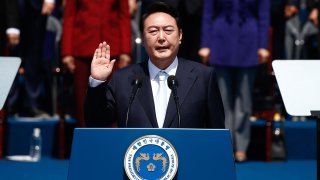
- South Korea's new president Yoon Suk-yeol, who was inaugurated on Tuesday, is not going to "have much of a honeymoon period," said Kathleen Stephens, president and CEO of the Korea Economic Institute of America and former U.S. ambassador to South Korea.
- Yoon has expressed his desire to see South Korea play a larger role on the global stage.
- But he's taking office with a "historically low approval rating" and has no political or foreign policy experience, Stephens said.
South Korea's new president Yoon Suk-yeol isn't going to "have much of a honeymoon period," said Kathleen Stephens, president and CEO of the Korea Economic Institute of America and former U.S. ambassador to South Korea.
"I think he said the right thing as he is inaugurated, about his desire to see Korea play a larger role in the global stage. I think that's shared across party lines in Korea, he's intended to address the challenges of North Korea and the economy," Stephens said.
Get San Diego local news, weather forecasts, sports and lifestyle stories to your inbox. Sign up for NBC San Diego newsletters.
"But I think no one in Korea and … others around the world are under the illusion about how difficult this is going to be."
Speaking on CNBC's "Street Signs Asia" after Yoon's inauguration on Tuesday, Stephens discussed what to expect from Yoon's leadership as he takes office.
"He's starting office with what has [been a] historically low approval rating before he has even taken office. He won a very, very by a very narrow margin of less than 1% in the election," she added.
Money Report
Calling Yoon a "political neophyte," Stephens said that local politics will be a "big challenge."
"He's facing local elections happening on June 1, where his rival in the presidential election is running for the National Assembly seat … [which] is dominated by the other party."
She was referring to Lee Jae-myung, who was Yoon's opponent from the Democratic Party. Yoon defeated Lee with 48.6% of the vote.
Navigating a 'geopolitical flux'
Yoon has neither political experience nor foreign policy experience, said Stephens.
"He is a lifelong prosecutor and lawyer. What he has done is recruit a team … many of them worked for previous conservative president Lee Myung-bak," she added.
"I think what we will see is a tougher rhetorical line on North Korea … a more robust effort to have things like military exercises to demonstrate deterrence against North Korea, to build up South Korean military capacity, to make sure the U.S. Korea security alliance is very, very strong."
However, Stephens said that Yoon will be looking out for chances to open up "space for dialogue" with North Korea, something which has been "true of previous conservative presidents."
Other tasks that Yoon faces include managing a "fractious relationship with China" while growing closer to the United States, she added.
Tom Rafferty, Asia regional director at The Economist Intelligence Unit, had previously shared with CNBC that Yoon has signaled he would pursue closer relations with the United States. However, that could affect Seoul's relations with China, South Korea's largest export market.
With this "geopolitical flux" in mind, Stephens said that Yoon's room for maneuver is fairly small, especially since he is "untested as a leader."
"But at the same time, there is a strong kind of bipartisan-based approach that has worked for [South] Korea for a long time."
Biden and Yoon's first meeting
U.S. President Joe Biden will be visiting South Korea and meeting Yoon for the first time on May 21. Stephens said that's a "very gracious and graceful sign."
"The American president and the Washington establishment recognizes that [South] Korea is a democracy ... and that the alliance transcends hopefully, partisan divides," she added.
"This will be our first chance to see really how President Yoon operates in the international environment."
Biden had previously expressed urgency in passing the Bipartisan Innovation Act, a multibillion dollar investment in the U.S. semiconductor industry. That makes the meeting "even more important," Stephens said, given that South Korea is a critical global player in the industry.
"I think that will be an important element of their discussion of how the United States and South Korea ... can work together for secure technology, secure supply chains," she added.






